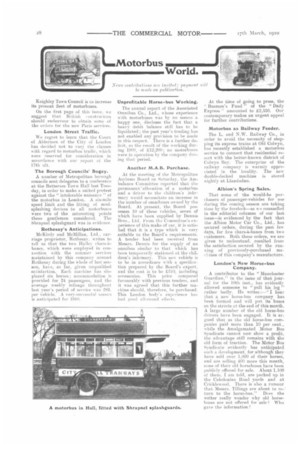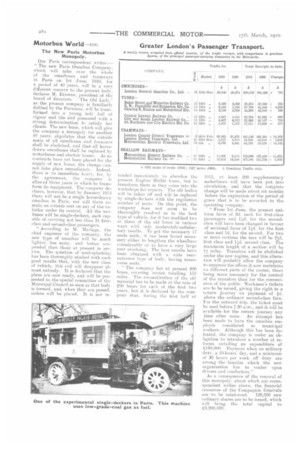L Motorbus I i News conteibutions aQ invited: payment irib" Le mode on publication.
Page 8

Page 10

If you've noticed an error in this article please click here to report it so we can fix it.
Keighley Town Council is to increase its present fleet of motorbuses.
On the first page of this issue, we suggest that Bri tisk ' London Street Traffic. We regret to learn that the Court of Aldermen of the City of London has decided not to vary the clauses with regard to motorbus traffic, which were reserved for consideration in accordance with our report of the 17th ult. The Borough Councils' Bogey. A number of Metropolitan borough councils sent delegates to a conference at the Battersea Town Hall last Tuesday, in order to make a united protest against the " intolerable nuisance " of the motorbus in London. A six-mile speed limit and the fitting of mudsplashing devices to all motorbuses were two of the interesting points these gentlemen considered. The Shrapnel splashguard was in evidence. Rothesay's Anticipations. McKirdv and McMillan, Ltd.. carriage proprietor, llothesay. writes to tell us that the two Halley chars-abanes, which were employed in connection with the summer services maintained by this company around Hothesay during the whole of last season, have, so far, given unqualified satisfaction. Each machine has displaced six horses ; accommodation is provided for 24 passengers. and the average weekly mileage throughout last year's period of service was 283. per vehicle. A very-successful season is anticipated for 1910. Unprofitable Horse,-bus Working. The annual report of the Associated Omnibus CO., Ltd., whose experience with motorbuses was by no means a happy one, discloses the fact that a heavy debit balance still has to be liquidated ; the past year's trading has not enabled any provision to be made in this respect. Titers is a further deficit, as the result of the working during 1909, of £12,200; no motorbuses were in operation by the company during that period. Another M.A.B. Purchase. At the meeting of the Metropolitan As urns Board on Saturday, the Ambulance Committee reported that the permanent' allocation of a motorbus and a driver to the children's infirmary would necessitate an increase in the number of omnibuses owned by the Board. At present, the Board possesses 10 of these vehicles, seven of which have been supplied by Dennis Bros., Ltd. From the Committee's experience of this make of car, it is satisfied that it is a type which is very suitable to the Board's requirements. Atender hod been received from Messrs. Dennis for the supply of an omnibus similar to that which has been temporarily stationed at the children's infirmary. This nee vehicle is to be in accordance with a specification prepared by the Board's expert, and the cost is to be £510, including accessories. This price compared favourably with previous tenders, and it was agreed that this further machine should, therefore, be purchased. This London body's experience has had good all-roliml effeets. At the time of going to press, the " Busmen's Fund " of the " Daily Express " amounted to £2,550. Our contemporary makes an urgent appeal for further contributions. Motorbus as Railway Feeder. The L. and N.W. Railway Co., in order to avoid the necessity of stopping its express trains at Old Colwyn, has recently established a motorbus service to connect that residential resort with the better-known district of Colwyn Bay. The enterprise of the railway company is warmly appreciated in the locality. The new double-decked machine is stored nightly at Llandudno. Albion's Spring Sales. That some of the would-be purchasers of passenger-vehicles for use during the coming season are taking time by the forelock—as we counselled in the editorial columns of our last issue—is evidenced, by the fact that the Albion Motor Car Co., Ltd., has secured orders, during the past few days, for five chars-h-bancs from two customers. Both these orders, we are given to understand, resulted from the satisfaction secured by the running of previously-purchased ma ci of this company's manufacture. London's New Horse-bus Company. A contributor to the " Manchester Guardian," in the issue of that journal for the .10th inst., has evidently allowed someone to "-pull his leg rather badly. He writes:—" I hear that a new horse-bus company has been formed and will put its buses on the streets at the end of this month. A large number of the old horse-bus drivers have been engaged. It is argued that as the old horse-bus companies paid more than 10 per cent., while the Amalgamated Motor Bus Syndicate cannot now shOw a profit, the advantage still remains with the old form of traction. The Motor Bus Syndicate evidently has anticipated such a development, for although they have sold over 1,000 of their horses, and are selling 400 more this month, none of their old horsebuses have been publicly offered for sale. About 1,100 of them, E am told, are packed up in the Caledonian Read yards and at Cricklewood. There is also a rumour that Messrs. Tillings are about to re-' turn to the horse-bus." Does the writer really wonder why old horsebuses are not offered for sale ? Who, gave the information? The New Paris Motorbus Monopoly. Our Paris correspondent writes:" The new Paris Omnibus Company, which will take over the whole of the omnibuses and tramways in Paris on 1st June, 1910, for a period of 40 years, will be a very different concern to the present body, declares M. Etienne, president of the board of directors. 'The Old Lady,' as the present company is familiarly dubbed by the Parisians, will be transformed into a young lady full of vigour and life and possessed with a strong determination to satisfy her clients. The new lease, which will give the company a monopuly for another 40 years, stipulates that the outside seats of all omnibuses and tramcars shall be abolished, and that all horsedrawn -omnibuses shall be replaced by motorbuses and electric trams. As no csntracts have yet been placed for the supply of new buses, the change cannot take place immediately. Indeed. there is no immediate hurry, for, by the • agreement, the company is allowed three years in which to transform its equipment. The company declares, however, that by January 1913 there will not be a single horse-drawn omnibus in Paris, nor will there remain an outside seat on any of the vehicles tinder its control. All the new buses will be single-deckers, each capable of carrying not less than 31 firstclass and second-class passengers. " According to M. Manage, the chief engineer of the company, the new typo of omnibus will be much lighter, less noisy. and better suspended than those at present in service. The question of mud-splashing has been thoroughly studied with such good results that, with the new class of vehicle, this evil will disappear almost entirely. It is declared that the plans are now ready, and will be presented to the special committee of the Municipal Council as soon as that body is formed, and, when they are passed, orders will be placed. It is not in tended immediately to abandon tho present Eugime Brillie buses, but to transform them as they come into the workshops for repairs. The old bodies will he taken off and will be replaced by single-deckers with the regulation number of seats. On this point, the company does not seem to be thoroughly resolved as to the best type of vehicle, for it has modified two or three of the old buses in various ways with only moderately-satisfactory results. To get the necessary 17 seats aside, it has been found necessary either to lengthen the wheelbase considerably or to have a very large rear overhang. The best resifts have been obtained with a wide rearentrance type of body, having transverse seats. " The company has at present 800 buses, covering routes totalling 1:35 miles. The reconstitution of the old materiel has to be made at the rate of 200 buses for each of the first two years, hut it is declared by the company that. during the first half of 1011, at least 200 supplementary motorbuses will have been put into circulation, and that the complete change will he made about six months before the expiration of the period of grace that is to be accorded to the operating company. " From 1st June, the present uniform fares of 3d. each for first-class passengers and 1A. for the secondclass will have been changed in favour of sectional fares of 1id. for the first class and id. for the second, For two or more sections the fare will be 20. first class and 1,124. second class. The maximum length of a section will be lt miles. Transfers will be abolished under the new regime, and this alteration will probably allow the company to suppress the offices it now maintains oa different parts of the routes, these being more necessary for the control of the transfers than for the convenience of the public. Workmen's tickets are to be issued, giving the right to a return journey on payment of id. above the ordinary second-class fare. For the outward trip, the ticket must be used before 7.30 a.m., and it will be available for the return journey any time after noon. An attempt. has been made to have the omnibus employes eonsidered as municipal workers. Although this has been defeated, the company is under an obligation to introduce a number of reforms entailing an expenditure of f:180,000. Payment when on military (hay, a 10-hours' clay, and a minimum of 30 hours per week off duty are among the benefits which the new organization has to confer upon drivers and conductors." As a consequence of the renewal of this monopoly, about which our correspondent writes above, the financial resources of the Compagnie Generale are to be reinferced. 126,000 new ordinary shares are to he issued, which will bring the total capital to 0,200,000.
























